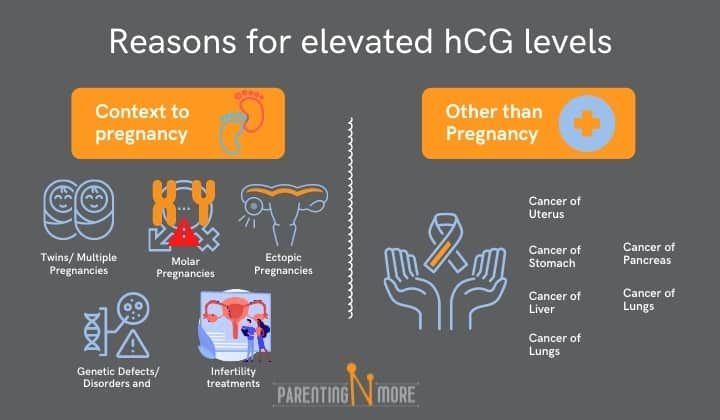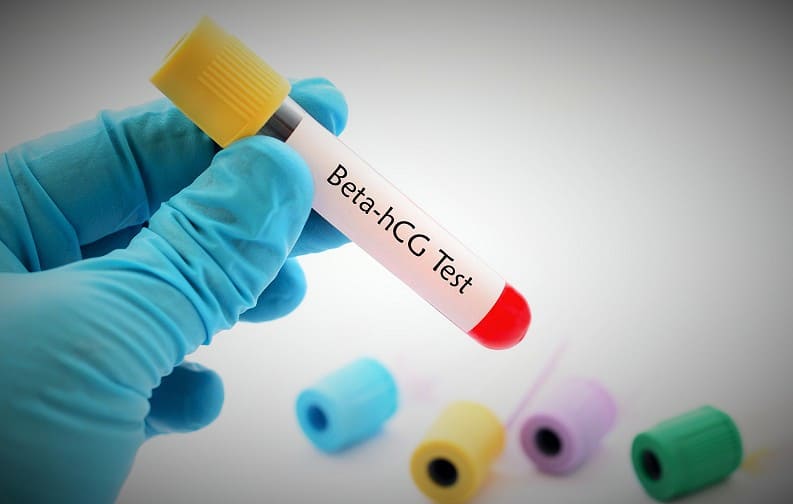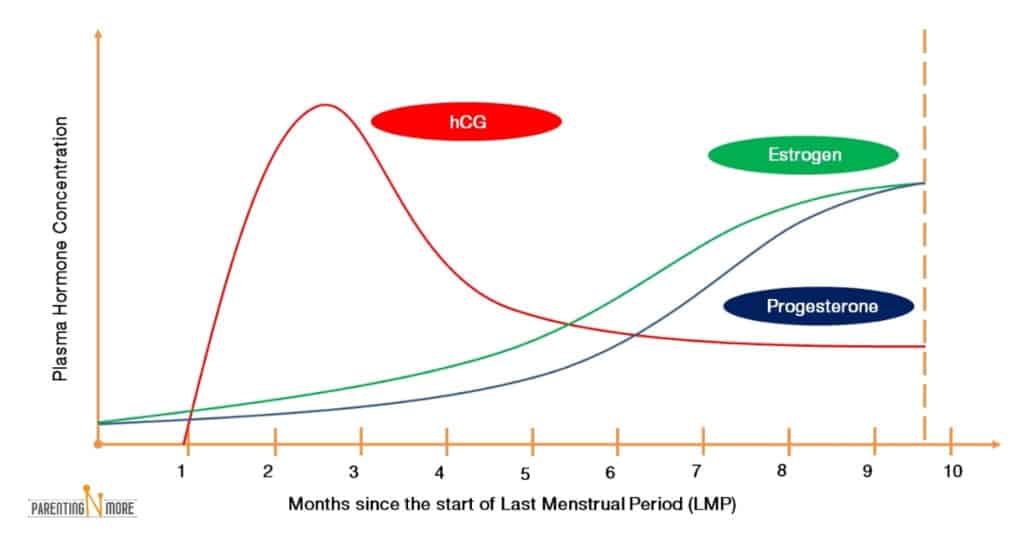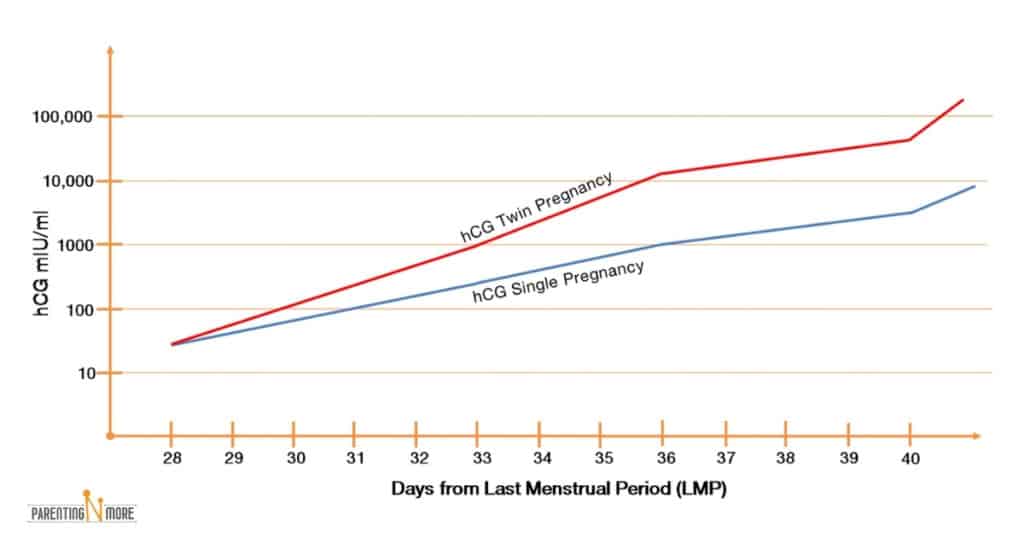hCG levels & pregnancy—All you need to know
-
Author: Palak Thakkar
- >> Post Created: September 13, 2020
- >> Last Updated: April 18, 2025
Medically Reviewed by: Dr. Veena Shinde (M.D, D.G.O, PG – Assisted Reproductive Technology (ART) from Warick, UK) Mumbai, India

hCG Levels Twins - Table of contents
For every mother-to-be, whether first-time mothers or even experienced ones, it’s natural to have loads of questions, even more when you are expecting multiples.
Other than the early signs of twin/multiple pregnancy; you will surely hear about hCG levels; generally, during your first blood/urine test to confirm your pregnancy.
You can have a list of questions (FAQs) on twin/multiple pregnancy such as what is Beta hCG, how do the hCG levels affect your pregnancy, hCG levels twins, hCG levels singleton vs twins
And so on…
No matter what has generated your interest in hCG levels, we’ve got all the answers you’re seeking through our article – ‘hCG levels for twins vs. singleton – What’s the difference?’.
A lot of parents want to comprehend hCG levels and a few want to understand hCG levels Twins. Sometimes high hCG levels could be an indicator of a twin pregnancy, but this is not definitive. High hCG levels in pregnancy can be due to other factors as well.
What is hCG?
Human chorionic gonadotropin (hCG) is an essential hormone produced by the developing baby to support fetal growth during pregnancy.
The purpose of this hormone is to communicate to the pregnant body that it needs to continue to produce progesterone. This prevents menstruation from commencing again and also protects the uterine wall lining during pregnancy.
The hormone progesterone stimulates the uterus to prep up for pregnancy. It is produced by an endocrine gland in the ovary called as the corpus luteum. The main purpose of hCG is to balance out the progesterone levels until the placenta is capable to produce progesterone on its own.
Its really fascinating to observe hCG level for Twins or multiples. They escalate exponentially as compared to single pregnancy.
Other than observing higher hCG levels with Twins or multiples, if you are not pregnant, and your hCG level is unusually high, it can be a sign of cancer, cirrhosis, ulcers, or inflammatory bowel disease (IBD). Your doctor will perform some follow-up tests to see if you continue to have high hCG levels without a pregnancy.
Read this next
hCG level chart for single pregnancy.
Weeks from LMP (Last Menstrual Period) | Approximate amount of hCG (in mIU/ml or IU/l) |
| 3 weeks | 5 to 50 |
| 4 weeks | 5 to 428 |
| 5 weeks | 18 to 7,340 |
| 6 weeks | 1,080 to 56,500 |
| 7 to 8 weeks | 7,650 to 229,000 |
| 9 to 12 weeks | 25,700 to 288,000 |
| 13 to 16 weeks | 3,300 to 254,000 |
| 17 to 24 weeks (second trimester) | 4,060 to 165,400 |
| 25 weeks to term (third trimester) | 3,640 to 117,000 |
| After several days postpartum | nonpregnant levels (<5) |
Looking at the table, you may notice that there is a very wide range of acceptable levels for every week after your last menstrual period. During your pregnancy, you will observe that your hCG levels elevate and then gradually become constant for some time before decreasing towards the end. Some scientist believe that hCG levels are related very closely with morning sickness.
hCG levels are usually analyzed over a period and not just as a one-time determinant.
A single test of hCG levels is not that useful because there are a variety of factors (including maternal smoking, body mass index (BMI) levels, use of fertility drugs, weight of the placenta, sex of the fetus, and even ethnicity) that can place someone within a wide range of acceptable hCG levels throughout their pregnancy.
hCG levels with Twins or multiples vary exponentially.
What is hCG Doubling time?
hCG doubling time refers to hCG levels doubling every 48 -78 hours during the initial few weeks of your pregnancy. This doubling time further increases to around every 96 hrs as the pregnancy progresses. This generally happens after around 6 weeks of pregnancy.
In a normal pregnancy, the hCG baseline level is very important cause that becomes the base for measuring the doubling time.
Generally, the level of hCG hormone reaching its peak is around the first 8-11 weeks, then it gradually decreases.
There are exceptions to hCG doubling time. In around 15% of feasible pregnancies may have slower doubling time.
So, that means that about 15% of viable pregnancies may have slower hCG doubling times.
Reasons and factors resulting in high hCG levels?

hCG levels – In the context to pregnancy
hCG is produced by the developing embryo in the placenta right after implantation. It can be detected in the blood or urine of the woman during the early stages of pregnancy through hCG level tests. This test is generally conducted when a women misses her periods.
Some of the reasons causing high hCG levels during pregnancies are:
- hCG levels Twins/ Multiple Pregnancies
- Molar Pregnancies
- Ectopic Pregnancies
- Genetic Defects/ Disorders and
- Infertility treatments
hCG levels Twins/ Multiple Pregnancies
hCG levels with Twins or multiple pregnancy generally show higher development of the hormone, obviously due to the number of embryos formed in the uterus (ref chart below – hCG levels singleton vs twins chart). Therefore hCG levels for twins/ multiple pregnancy generally rise exponentially in case as compared to singletons.
Sometimes, high levels of hCG can be due to a molar pregnancy and ectopic pregnancy.
Molar Pregnancies
What are molar pregnancies?
This is a rare condition also known as hydatidiform mole, known to occur in 1 out of 1,000 pregnancies. It’s also known as Gestational Trophoblastic Disease or GTD as well.
Molar pregnancy is caused by chromosomal abnormalities that disrupt the development of the embryo. In a healthy pregnancy, an embryo develops from a set of maternal and paternal chromosomes. A molar pregnancy is characterized by abnormal growth of trophoblasts, the cells that develop into forming the placenta.
This condition arises because of issues encountered during the fertilization process (sperm joining the egg to fertilize), which results in abnormalities within the placenta.
Molar pregnancies are generally of two types—Complete Molar Pregnancy or Partial
- Complete Molar Pregnancy: In complete molar pregnancy, the placental parts are present, but without a baby. This happens when an empty egg is fertilized. The placental tissue is abnormal and swollen and appears to form fluid-filled cysts. However there is no formation of the fetal tissue.
- Partial Molar Pregnancy: is a genetic accident. In a partial molar pregnancy, the egg receives 2 sets of chromosomes from the father (instead of 1 set). This can happen if two sperms fertilize a single egg. The resultant egg would now have 69 chromosomes, instead of the normal 46 chromosomes (23 from father and 23 from mother).
Further in a partial molar pregnancy, there could be normal placental tissue along with an abnormally developing placental tissue. There could also be a formation of the fetus. However, the fetus is not able to survive, and is usually miscarried while in early stages of the pregnancy.
This happens because the fetus is rapidly overcome by the abnormal mass of cells which are formed due to overdeveloped placenta, leading to a mole that keeps growing.
In some cases of partial molar pregnancies, 1 embryo grows normally and the other is a molar pregnancy. In such a case, the healthy and normal embryo can get consumed by the abnormal mass.
Generally women older than 40, who have had a history of previous molar pregnancies or miscarriages, are at a much higher risk of having a molar pregnancy again.
There are symptoms associated with molar pregnancy—vaginal bleeding/spotting, vomiting, nausea, thyroid related complications, highly elevated beta-hCG levels, early preeclampsia, no fetal heartbeat or movement detected, and other rare complications.
Ectopic Pregnancy

Another reason for high levels of beta-hCG can be the beginning of an ectopic pregnancy where the embryo grows outside the uterus, mostly in fallopian tube. This must be treated immediately, as the fallopian tubes are not designed to hold a growing embryo.
Generally, ectopic pregnancies are complicated and may result into a termination at the end.
Genetic defect/disorders
These happen during conception and fertilization. Any alterations in the normal genealogy or chromosome combinations can lead to genetic defects or genetic disorders in the embryo thus formed.
One such genetic defect is the Down Syndrome. Down syndrome is caused when there are three copies of the genes on chromosome 21, rather than the usual two. The parents of children with Down Syndrome are typically genetically normal and unaffected.
Such disorders can result in highly spiked beta-hCG levels.
Infertility treatments
hCG hormone injections form a major part of the treatment plan for treating infertility in women. This too can cause an unusual increase in the hCG levels.
Factors other than pregnancy affecting hCG levels
Elevated levels of hCG can also occur due to a gestational trophoblastic tumor, a rare form of cancer. If treated early, it is highly curable.
Higher hCG hormone levels is also a marker for cancer of uterus, stomach, liver, lungs, pancreas, and large intestines. It is advisable to take doctors advise rather than reaching conclusions on seeing the test reports in such cases.
Why is the hCG-level test performed?
Your doctor may prescribe you to get the beta hCG levels test done. This could be for multiple reasons:
- Most commonly performed to confirm pregnancy.
- To identify and later diagnose any abnormality such as ectopic pregnancy, where the conception happens and develops within the fallopian tube.
- To diagnose a potential miscarriage.
- To identify the levels of the protein PAPP-A in the blood which, when low, increases the chances of the fetus having Down Syndrome.
How does hCG testing work?
The first blood test for hCG typically provides your doctor with a baseline. Your doctor will then observe changes in your hCG levels regularly over subsequent blood tests.
After you have missed your period within the first 4 weeks of a viable pregnancy, your hCG levels will generally double every 48–72 hours. Post this period, your hCG levels will grow slowly, doubling every 96 hours till around the 6 week point.
Your doctor will pay close attention to your hCG levels early on in your pregnancy.
This is because miscarriages or failing pregnancies typically show longer doubling time early on and may even begin to fall when they should be doubling.
However, pregnancies that start with a higher baseline of hCG may take slightly longer to double without this being a sign of concern in the pregnancy.
If your doctor notices that hCG levels are not following expected patterns, they may request additional blood tests every few days to get a better idea of how the levels are changing. Further if your doctor suspects exponential growth in your hCG levels then they may ask you to go for an ultrasound to confirm if there are multiple pregnancies involved.
Generally, the hCG levels should peak around 10–12 weeks post your last period and will slowly diminish during the rest of your pregnancy. The hCG for Twins or multiples differs exponentially as compared with singletons. Refer: ‘hCG level for Twins vs. Singleton chart’, below.
Within a few weeks of postpartum (post-delivery), hCG levels should be undetectable. In rare cases that this does not happen, it may indicate some residual hCG-producing tissue which would have to be removed.
It has been seen that if the hCG levels are not in line with the typical pattern, then the pregnancy could have adverse outcomes. These may include fetal loss or miscarriage, preeclampsia, preterm delivery, postpartum preeclampsia, and chromosomal abnormalities.
Don’t hesitate to ask your healthcare provider about hCG levels, in case you feel something is amiss in your reports.
Which are the tests which determine hCG levels and are they painful?
Your hCG levels can be determined in two ways—a Blood test and a Urine test. Both are painless tests (except for the small prick for the blood test).
You can do any one of the tests, after 10 days of missing your menstrual period, if you are unable to determine the date of ovulation.

Qualitative & Quantitative blood test
A qualitative blood test determines the presence of hCG, whereas a quantitative blood test helps you to find the amount of hCG levels present in your blood. Basically, a blood test is the most reliable way to keep track of hCG levels throughout your pregnancy.
This test can also help to identify progesterone levels, monitor pregnancies, monitor hCG level for Twins & multiples, or correctly diagnose ectopic pregnancies, cancer, and failed pregnancies.
People with bleeding disorders can experience problems after the blood tests, like swelling in the veins. However, this is very rare and generally no one experiences any problem due to blood tests.
Urine Test
A home urine test is about 97% accurate (provided it is performed as instructed). In these tests a stick or strip is exposed to a woman’s urine, and if it changes color or shows the required number of stripes, etc. (read the instructions to know what are the indicators for pregnancy in that particular kit), then it means the test is positive and that you are pregnant.
Always test two or three times with kits from different brands to positively know whether you are pregnant or not. There can be false positives and negatives too. After all, it is only 97% accurate.
How often do hCG levels multiply?

*This is a reference graph not to the scale. The objective is to show a general trend and not specific values
After fertilization, as the embryo grows and develops into a fetus, there is a steady increase in the amount of hCG released. It generally doubles every 48–72 hours, based on the concept of ‘doubling time.’
As your pregnancy progresses, the release of hCG gradually slows down. It takes 72–96 hours to develop between 1200–6000 mIU/mL.
When the hCG levels cross 6000 mIU/mL mark, then it takes almost 96 hours or more to double. Later the hCG levels become slower and remain more or less consistent till the end of your pregnancy.
Once the hCG levels cross 6000 mIU/mL, you can do an ultrasound for a clearer picture of your baby’s progress in your womb. It is always good to do an ultrasound if there are any doubts regarding fetal age and growth, as the hCG levels vary during different periods of the pregnancy. A transvaginal scan is more accurate than the abdominal scan and, therefore, is preferred by doctors.
The results from the ultrasound at 5–6 weeks are more reliable as compared to a quantitative hCG if it shows low levels of hCG than normal. Your baby could still be healthy so long as the ultrasound confirms the same in spite of the results you get through hCG.
Can the hCG levels in the body be correlated to a healthy pregnancy?
A good steady increase in hCG levels when you are pregnant is an indicator that your pregnancy is progressing well.
It also is an indicator that the fetus is growing well.
But if you say ‘healthy pregnancy’, it means that you and your baby born post-delivery is healthy then such a co-relation cannot be established. This is because as the pregnancy progresses the hCG level shows variations and start decreasing. There are cases where the hCG levels recorded were low in comparison to normal levels, but the baby delivered was perfectly healthy.
Basically, having hCG levels within the prescribed range, can mean that your fetal growth is going on well. However, more definitive way to know about fetal growth is through an ultrasound.
What does it mean if the hCG levels do not go up?
Be it hCG level for Twins or singletons, your hCG levels should rapidly go up in the initial phase especially in the first 8–10 weeks of your pregnancy.
If in case your results seem somewhat constant or you see a drop in hCG levels, then it is a sign that your pregnancy is not progressing right. However, to make sure, your doctor will ask you for your ultrasound report as well.
Based on both the reports, your doctor can confirm if there is any issue with your pregnancy. Generally once you are at hCG 1000–1200 mIU/mL, you can go through your ultrasound intravaginally which is more accurate.
If there is any indication during ultrasound, where the gestational sac cannot be seen, then it’s a concern and if this occurs you need to consult your doctor immediately.
It is always good to have an understanding on hCG level for twins and singletons as you can be well prepared as well as stand strong under any circumstances.
hCG levels Twins vs. Singleton – What’s the difference?
For every mother of multiples, like me, I used get super anxious to know if my pregnancy was progressing well. Wish I had such a good reference of hCG levels singleton vs. twins chart.
However, as you observe in the very initial phase, it is difficult to comprehend as the hCG levels are overlapping in both cases – hCG levels twins vs hCG levels singleton.
Rest assured as the days progress, the hCG levels for twins/multiples range starts looking strikingly different from single pregnancies.
Here’s a comparison between hCG levels twins vs singleton, for your reference.
hCG Levels Twins Chart by week/ days
hCG levels singleton vs twins Chart

*Above graph is plotted on the approximate median values of the range. The objective is to show the general trend rather than specific values itself.
hCG Level for Twins chart / hCG levels singleton vs twin pregnancy
hCG Levels singleton vs twins/ beta hCG levels twins chart | ||
| Days from last menstrual period | Single Pregnancy hCG | Twin Pregnancy hCG range | mIU/mL |
| 28 | 9.4–120 | 9.5–120 |
| 33 | 300–600 | 200–1,800 |
| 36 | 1,200–1,800 | 2,400–36,000 |
| 40 | 2,400–4,800 | 8,700–108,000 |
| 45 | 12,000–60,000 | 72,000–180,000 |
| 70 | 96,000–144,000 | 348,000–480,000 |
Is it true that hCG level for Twins or multiples are very high?
Does this mean that high hCG level can confirm a twin/multiple pregnancy?
hCG levels is an important determinant in recognizing a twin and multiple pregnancy. However, it is not the sole determinant as an increased hCG level can be the result of several other conditions as well.
One of the studies done in 2018 — states hCG count may indicate twins, but it is not conclusive in itself.
As discussed earlier in the article, there are other factors because of which the hCG levels can be high in a woman.
Hence, to determine if you are pregnant with twins or multiples, your doctor will ask you to go and get an ultrasound done. Multiples can be detected as early as 6 weeks after conception.
In addition to higher hCG levels during your pregnancy, if you’re pregnant with multiples, you may also experience various symptoms like acute nausea, extreme fatigue etc.
Key Takeaway
If you are having high hCG levels than normal in your pregnancy, it could be an indication of twin or multiple pregnancy.
An ultrasound is a definitive test to confirm a twin or multiple pregnancy.
Having hCG level in line with the normal range be it single or multiple pregnancy does indicate good progress of the fetus during the initial weeks. However an ultrasound is a better determinant for fetal growth.
hCG level tests have to be done on a regular basis for your doctor to monitor the fetal growth.
We have detailed out all you need to know about hCG levels during pregnancies and otherwise; tried to explain the probable relation of hCG with respect to twin or multiple pregnancy – ‘hCG levels twins’ ; and provided clear understanding on average hCG levels Singleton vs Twin pregnancy. Hope we have covered all that you needed to know.
Do let us know if you have any queries on this article. We are planning to address faqs on being pregnant with multiples as well. Feel free to write to us.
Happy Pregnancy!











So much wonderful information here! Thank you. It’s very well explained and easy to follow.
Thanks
Very informative article thanks for sharing
Informative! Thanks for writing this.
Thanks
Fantastic and detailed information.Very well researched. Keep it up.
Thanks Rodney
You need to take part in a contest for one of the greatest websites on the net. I most certainly will highly recommend this blog!
Superb information. Nicely explained.
I am pregnant with twins and it is so wonderful to know changes happening in your body. It’s a miraculous play of nature.
Thanks Drew.
Women’s body goes through a lot of changes when she is pregnant. Moreover, in case of twins or triplets its in the overdrive. Being a mother of triplets I can understand what you are going through. These are exciting times.
All the best!
I must say, its an excellent article. Well written and explained.
I am expecting twins and hcg levels shot up. Was searching for the info when I bumped upon this post.
Nice post. Write more, thats all I have to say.
Literally, it seems as though you relied on the video to make your point. You obviously know what youre talking about, why waste your intelligence on just posting videos to your site when you could be giving us something informative to read?
Well researched and well written. Information here on hcg levels is really good. Especially your video is helpful
It is best to take part in a contest for top-of-the-line blogs on the web. I’ll recommend this website!
Well written and nicely articulated.
Keep-up the good work.
Thanks Nora.
After looking into a number of the articles on your blog, I truly appreciate your technique of blogging. I saved as a favorite it to my bookmark site list and will be checking back soon. Please check out my website too and tell me how you feel.
Hi, I do believe your site may be having browser compatibility problems. When I take a look at your website in Safari, it looks fine however, when opening in I.E., it’s got some overlapping issues. I just wanted to give you a quick heads up! Aside from that, excellent website!
Thanks Kerry for your feedback. Will look into it.
I am glad you liked our blog.
Thanks for the clear information on this topic. You have simplified hCG levels a lot for everyone to understand.
Thanks Reagan. I am glad you like the post.
I’d always want to be update on new content on this website, saved to favorites!
Thanks Cindy.
I am glad you like our blog. Your words mean a lot to us.
Hello. excellent job. I did not anticipate this. This is a impressive story. Thanks!
Its fantastic as your other posts : D, regards for putting up.
Thank you Patricia
I truly treasure your piece of work, Great post.
Does your blog have a contact page? I’m having problems locating it but, I’d like to shoot you an email. I’ve got some creative ideas for your blog you might be interested in hearing. Either way, great site and I look forward to seeing it grow over time.
I like this post, enjoyed this one.
Regards for putting up.
I went over this web site and I believe you have a lot of fantastic info , bookmarked (:.
he blog was how do i say it… relevant, finally something that helped me. Thanks
I like this web site so much, bookmarked.